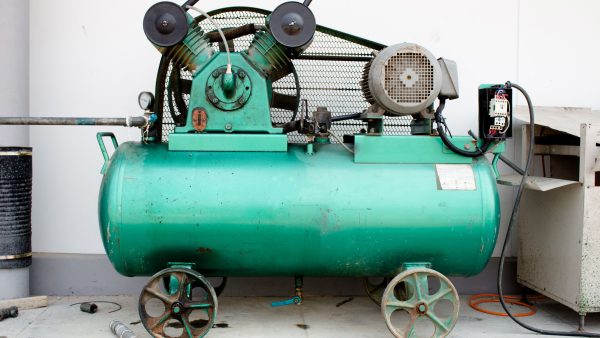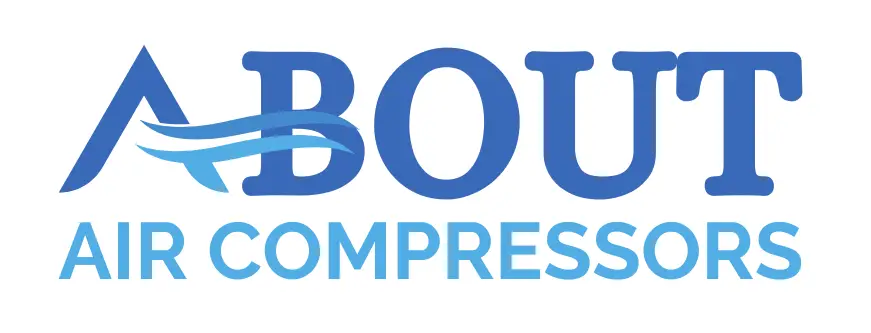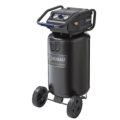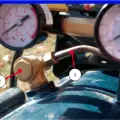Hey! This site is reader-supported and we earn commissions if you purchase products from retailers after clicking on a link from our site.
Heating issues are one of the most common causes of performance issues arising with an air compressor. Not only this, but an air compressor overheating is one of the most common causes of failure, even with compressors that might otherwise last for many additional years. Which beckons the question, what causes an air compressor to overheat?
An overheated air compressor is typically a result of several internal factors, external conditions, or potentially even both. During certain points of a system cycle, the air becomes hot due to the compression processes involved, though it swiftly cools before it reaches your pneumatic tools.
However, if the air becomes too hot for the compressor to handle, or certain components of the air compressor system are overheating, something has indeed gone wrong with the machine.
So, how do you prevent an air compressor from overheating? This article will provide you with all the relevant information on why your air compressor overheats along with some overheating compressor troubleshooting tips to learn how to manage an overheated compressor.
Table of Contents
- 9 Most Common Reasons for Air Compressor Overheating
- Air Compressor Overheating Symptoms
- How to Prevent Your Air Compressor From Overheating
- FAQs (Frequently Asked Questions)
9 Most Common Reasons for Air Compressor Overheating
When an air compressor overheats, the problem is generally related to factors involving irregular suction or discharge pressure. However, the problem could also stem from insufficient ventilation, insufficient or eroded oil, or any given number of issues related to the wear and tear of machine parts.

Here are the 9 most common reasons causing an air compressor to overheat:
- Low suction pressure
- Excess discharge pressure
- Insufficient or eroded oil
- Old or clogged components
- Defective thermal valve
- Inadequate ventilation
- Ambient temperature
- Type of air compressor
- Frequency of use
Now, let’s take a look at each of these reasons and better understand them!
1. Low Suction Pressure
One of the most common problems that will cause an air compressor to overheat is having a high compression ratio, which is a result of low suction pressure. Low suction pressure is caused by any of the following:
- Defective metering devices
- Improperly fitted components
- Loss of refrigerant
- Pressure drop
If the metering devices are defective in any way, for example, your ability to monitor the system with accuracy will become compromised. In order to be able to maintain a high value of suction pressure, it is crucial to check for signs of these issues on a regular basis as part of your preventative maintenance schedule.
2. Excess Discharge Pressure
If you have excess discharge pressure, you will undoubtedly experience air compressor overheating issues. Excess discharge pressure typically stems from one or more of the following issues:
- Blocked, inconsistent, or undersized condenser
- Dirty condensing coils
- Overcharging refrigerant
- Poorly fitted discharge line
To keep discharge pressure levels under control, you must inspect the condensing components frequently for any signs of issues. Even on larger systems that have built-in discharge monitoring, some issues may go undetected until the problem spreads to other parts of an air compressor system.
3. Insufficient or Eroded Oil
When oil becomes old it typically begins to erode and harden, resulting in the moving interior parts of the compressor system being forced to move without sufficient lubrication. This is the same if you have insufficient oil within the system.
The surfaces of metal moving components will grind against one another and cause the components to endure strain as the machine is forced to work extra hard just to perform at its normal level. Old, hardened oil is a common cause of an air compressor system overheating.
As the moving components wear down, you will typically need to replace the oil at more frequent intervals. If the air compressor emits a burning oil-like smell, this is a great indication that the oil has become hardened at the expense of the compressor’s cooling abilities. On top of this, the heat could lead to the oil losing its viscosity which will ultimately result in further issues.
4. Old or Clogged Components
Components of an air compressor naturally wear down with age, and with this, the system as a whole is forced to work harder to complete its basic function of providing compressed air to your end-use. For example, if the interior components become clogged in vital areas, the air compressor will have to exert a lot more energy just to be able to get air from the compression chamber and off to the hoses that connect to your pneumatic tools.
In order to ensure that the interior components continue to operate as efficiently as they should, without generating excess heat in the process, it’s your duty to have the interior performance evaluated on a periodic basis.
5. Defective Thermal Valve
A defective thermal valve can easily lead to heating issues with your air compressor. A lot of air compressor users will recommend having a replacement thermal valve on hand in case the preexisting valve on your machine needs to be changed out at any point.
The reason for this is that you will be able to avoid any potential downtime that may arise if the thermal valve fails and you are forced to wait for days or weeks for a new one to arrive.
In addition to this, a new valve is handy to have as it can be used to compare with the preexisting valve to check if it is in a sufficient operating condition. If it’s not, you will have found a potential source of your overheating problem.
6. Ambient Temperature
Ambient room temperature is always something you should keep in consideration when using an air compressor. What are temperatures like in your place of operation? Of course, temperatures increase in various regions, and conditions that were ideal for air compressors not so long ago could now require adjustment.
With summer temperatures ever-increasing with climate trends, making it far hotter in your local area, then it may be time to boost the air conditioning in the workspace that houses your compressed air system to ensure it is not operating in too hot of an ambient temperature.
If the air compressor is situated within a warm area, the machine is liable to have far more difficulty adjusting to the incoming air at its desired levels of coolness. For example, if the machine is in a room with inadequate ventilation, the heat within that room will affect the internal processes and result in warmer, less efficient air at the end-points for your pneumatic operations.
In addition to this, the surrounding heat can also lead to the buildup of internal moisture and condensate, which will ultimately negatively impact other vital air compressor functions.
7. Inadequate Ventilation
That brings us to the point of inadequate ventilation, which ties in nicely with ambient temperature. Is the air compressor able to sufficiently ventilate or have the vents become blocked or cramped?
If the air compressor is placed in such a way that the vents are facing against a wall directly, the air compressor should be turned or possibly moved to another area.
On top of this, if the room where the air compressor is placed lacks sufficient ventilation, the stuffiness and warmth of the room air could steal the machine of its much-needed coolness.
8. Type of Air Compressor
Certain types of air compressors are more suited to demanding tasks than others. Therefore, if you are running heavy-duty pneumatic tools for extended periods of use from one small air compressor, you are likely to run into performance issues that will result in the air compressor overheating.
Likewise, if the compressor is older than say 20 years, it could simply be time for a replacement as it cannot keep up with the demand. You must consider the size and capacity of your compressed air system in relation to the requirements and demands at hand.
9. Frequency of Use
Of course, the frequency of use of the air compressor is going to contribute to the amount of wear and tear that an air compressor endures. The speed of the wear and tear depends on the temperatures the compressor is operating at and the length of time. If the air compressor is old and used every day, it will be inevitable that you experience heating issues at some point during your continued operation of the machine and its various components.
Air Compressor Overheating Symptoms
If your air compressor is behaving abnormally, there is no doubt a problem that more often than not will stem from the air compressor overheating. If you experience any of the following 4 symptoms then it’s likely that your air compressor is indeed overheating:
- The compressor won’t turn on
- Circuit breaker tripping
- Accelerated wear and tear
- Oil-related issues
The Compressor Doesn’t Turn On
If your compressor fails to start up as normal, there is certainly something wrong with the system that could likely be stemming from a heating issue. If the air compressor starts to require longer intervals between its usage cycles, then the internal components are probably taking a lot longer to cool down between each cycle.
Likewise, if the air compressor stalls during startup and ultimately takes longer than it should get into full operational mode, this is likely due to the overheating of the compressor damaging internal mechanisms. Visit our article on air compressor won’t turn on for more detailed information!
Circuit Breaker Tripping
Circuit breakers regulate the current flow in an air compressor. They stop the flow of electricity to the motor, halting operations, when necessary as a protective measure for the performance and quality of the machine. Circuit breakers will be tripped by the thermal overload button, which is designed specifically to trip when the air compressor overheats.
If the circuit breaker acts irregularly and trips at seemingly random moments, this is a great indication that bigger problems lurk inside the air compressor. Visit our Air Compressor Keeps Tripping Circuit Breaker guide for more information!
Accelerated Wear
When an air compressor starts to wear down a lot faster than it should, this could indicate that there is a more serious matter at hand. For example, if the machine exhibits performance issues just a matter of days or weeks after it was last serviced, something has probably not been evaluated properly.
There could easily be an issue related to overheating if the air compressor is struggling to handle basic demands and is long before its time.
Oil-Related Issues
Air compressors can emit noises or smells that indicate oil erosion. If you can hear faint creaking noises from the machine that seems to be abnormal, it could be a matter of eroded or insufficient lubrication around the internal parts. A more clear-cut sign of an air compressor having oil trouble is when the air compressor emits smells of burnt oil.
Either way, any oil issue should be inspected immediately, as insufficient lubrication or poor oil quality can have a rippling effect on the internal mechanisms of an air compressor system. Visit our Air Compressor Oil Related Issues guide for more information!
How to Prevent Your Air Compressor From Overheating
People often wonder about the methods to cool down an overheated compressor. And as simple as it sounds, all you have to do is cease operation and allow the air compressor to cool down by itself. A better question, however, is how do you prevent an air compressor from overheating?
Why wait for the air compressor to overheat before cooling it down when we can take some steps to prevent it from occurring in the first place. Here are some tips to help prevent your air compressor from overheating:
- Improve ventilation
- Monitor ventilation
- Inspect oil level and filters regularly
- Replace parts when necessary
Improve Ventilation
The first step towards being able to limit heating issues with an air compressor is focusing on the internal and surrounding ventilation. You should inspect each vent to ensure that they are sufficient for the demands of the machine. If they are not, you will need to have the vents replaced ASAP.
You should also be considering the external factors of the air compressor itself. If the air compressor is situated within an area that is either too hot or not sufficiently ventilated, you must arrange space for the air compressor in a more suitable area. While also making sure that the new placement allows plenty of breathing room for each of the vents.
Monitor Ventilation and Ducting
Even after you have modified or improved the layout of your workspace so that it better ventilates the air compressor and the surrounding temperatures, you will still need to inspect the ventilation and ducting on a regular basis. If dirt or dust is allowed to accumulate along with the vents, you will need to clean them out accordingly. Also, ensure there are no crimps or punctures so that the ducting flows properly.
Inspect Oil Level and Filters Regularly
It is crucial to ensure that the oil in an air compressor is healthy. You should check the oil level on a regular basis to ensure that there is enough to handle the significant demands of your operations. Also, be sure to check the viscosity to make sure that the oil has not become too thin or watery — as this would be a sign of excess heat within the system.
In addition to this, check the filters during each oil inspection to ensure they’re not clogged and are working properly.
Replace Parts When Necessary
The air compressor that you initially purchase will likely not be as efficient as it once was due to the demands of your operations evolving and the air compressor in line with its components beginning to age. If your operations have started to demand increased amounts of air power due to the use of greater-sized tools since the time that you first bought the machine, then you should consider updating your air compressor with more optimal components.
Often, the performance of an air compressor will steadily decline as operational demands progressively increase. As the additional strain mounts along with the increased demand, various points of a compressed air system will begin to undergo heating issues.
To prevent this from happening to your compressor, you should have the air compressor and all of its components evaluated by a service specialist. It may also be worth asking for advice on any types of upgrades that could bring the system to a point where it can manage the increased demand of your workload.
FAQs (Frequently Asked Questions)
If your air compressor overheats, the first thing that will likely occur is the thermal overload button tripping which trips the circuit breaker to halt power from reaching the air compressor, and so, the air compressor will shut down and won’t turn on until it has cooled down. You’re likely to experience accelerated wear and tear on the compressor and its components, along with potential oil-related issues if your air compressor is consistently overheating.
The best way to combat an air compressor overheating is to prevent it from overheating. Some available methods include improving your ventilation to ensure the existing system is working sufficiently and also considering the location of your compressor and whether it is placed in too hot of an environment. After improving your ventilation, you must regularly monitor it, to ensure that no dirt or dust accumulates. Aside from ventilation, you should regularly be inspecting the compressor’s oil level and filters, along with replacing any parts when necessary.
When your compressor is hot, this indicates that it is having to work harder than usual to keep up with your regular demand. This could be due to many issues including low suction pressure, excess discharge pressure, insufficient or eroded oil, old or clogged components, defective thermal valve, inadequate ventilation, ambient temperature, type of air compressor, and its frequency of use. It’s recommended to allow your air compressor time to cool down and implement some measures to prevent the air compressor from overheating.
If you have any questions regarding why your air compressor overheats, please leave a comment below, with a photo if applicable, so that someone can help you!





